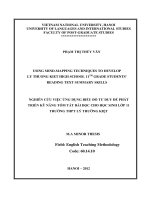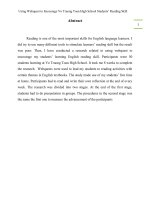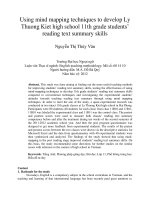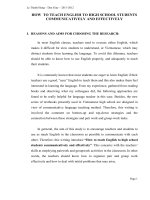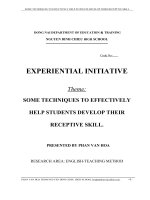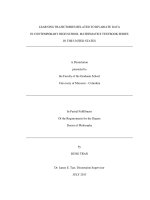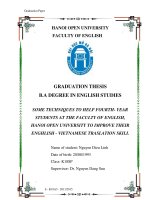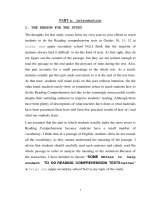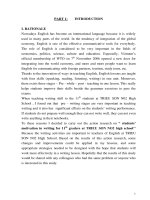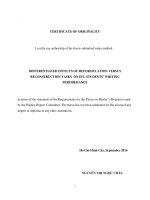Some techniques to help trieu son 3 high school students identify and use the correct form of the part of speech
Bạn đang xem bản rút gọn của tài liệu. Xem và tải ngay bản đầy đủ của tài liệu tại đây (264.48 KB, 20 trang )
THANH HOA DEPARTMENT OF EDUCATION & TRAINING
TRIEU SON 3 HIGH SCHOOL
=~=~=~=~=~=~=~=~=~=~=~=~=
EXPERIENCE INNOVATION
TITLE:
“Some techniques: To help TRIEU SON 3 HIGH
SCHOOL students identify and use the correct
form of the part of speech”
Implemented by: Nguyen Minh Hai
Job position: Teacher
Experience innovation of subject: English
THANH HOA, YEAR 2020
Par
t
Table of contents
Page
1.
2.
3.
Introduction
1.1. Reasons for choosing the research
1.2. Aims of the research
1.3. Scope and object
1.4. Researching method
CONTENT
2.1. The reasoning basis of the theme
2.2. Some methods to solve the problem
A. General procedure
B. Specific procedure
C. The specific implementation steps
2.2.1. Nouns.
2.2.2. Adjectives.
2.2.3. Adverbs.
2.2.4. Verbs.
D. Practical applications.
2.2.5- SUBJECT + VERB + ADJ/ ADV/ NOUN.
2.2.5.1- SUBJECT + BE / LINKING VERBS + ADJ
2.2.5.2- SUBJECT + VERB + ADV
2.2.5.3- SUBJECT + VERB + NOUN
2.2.5.4- SUBJECT + VERB + THE + ADJ
2.2.6- SUBJECT + VERB + TO INFINITIVE
2.2.7- SUBJECT + VERB + “OBJECT” + TO INFINITIVE
2.2.8- SUBJECT + VERB + BARE INFINITIVE
2.2.9- SUBJECT + VERB + OBJECT + BARE INFINITIVE
2.2.10- SUBJECT + VERB + V-ING
2.2.11- VERB + TO INFINITIVE / V-ING
2.2.12- SUBJECT + VERB + IT + ADJ/ NOUN + TO INFINITIVE
2.2.13- NOUN / V-ING / TO INFINITIVE + V + O
2.2.14- ADV + S + V + O
E. Practical exercises.
* Samples: UNIT 10: NATURE IN DANGER
UNIT 15: SPACE CONQUEST
F. Instruct students to study vocabulary at home.
conclusion
3.1. Learned lessons
3.2. Gained results
2
3
4
5
6
7
8
9
10
11
12
13
14
15
16
17
18
1. Introduction
1.1. Reasons for choosing the research:
Today, English is the popular language in the world. There are more than
forty countries, which use it as an official language, and nearly 500 million
2
2
people use it as a second language in communication. In Vietnam, English is
also considered the official foreign language in schools. Despite this, many
students in Trieu Son 3 high school are not good at English. They only learn
English to deal with the tests without practicing knowledge in their lessons
voluntarily; not even do the homework. One of the reasons is that they do not
have much vocabulary knowledge or they are not interested in looking up new
words and all kinds of words in the dictionary while they are doing their
exercises. Meanwhile we also know that vocabulary has a very important
contribution to the completion of grammatical exercises and improvement of
four skills.
According to the urgent needs of learning language and practical learning
situation of my students, I chose the theme: “Some techniques: To help Trieu
Son 3 High School students identify and use the correct form of the part of
speech” to help the school’s students understand the part of speech and have the
lexical establishment skills. They can also know how to use the words in the
correct form of grammar and to be consistent with mentioned context. Because
of test "Using the correct form of the words" is also an important point of
grammar. This form is not only very difficult but also appears much in English
grammar section. Besides, Students often meet this form in the major exams
such as college entrance exams, etc…
1.2. Aims of the research:
- To show some techniques to help students identify and use the correct form
of the part of speech.
- To help students know how to use the words in the correct form of
grammar and to be consistent with mentioned context.
- Give students confidence in identifying and using the correct form of the
part of speech in the sentence.
1.3. Scope and object:
- Researching in the process of teaching English at my classes;
- This subject is concerned with some techniques that students of all three grades
can identify and use the correct form of the part of speech effectively.
1.4. Researching method: Reading reference books; discussing with other
teachers; applying in teaching; observing and drawing out experiences.
2. CONTENT
2.1. The reasoning basis of the theme:
According to some of the authors’ linguistic papers: [An, 2003; Asgari &
Mustapha, 2011; Dagiima, 2009; Richards & Farrell, 2011; Schmitt, 1993;
Schmitt, 2000; etc …..]. Teaching and learning vocabulary play a very important
role in learning the English language. However, most of the students from my
classes who are still confused about identifying and using the correct form of the
part of speech and the location of them in the sentence. That is why they always
find difficult and boring to learn English language.
All of these reasons have paved the way for me to research and apply some
techniques to teaching and learning English vocabulary in general and to help
3
3
Trieu Son 3 High School students identify and use the correct form of the part of
speech in particular. In hope that in case the expected outcomes would be
fulfilled, the study could contribute to better the vocabulary learning for my
students.
2.2. Some methods to solve the problem:
Because of the reasons and mentioned studies above, I have applied some
techniques helping Trieu Son 3 High School students identify and use the correct
form of the part of speech effectively in learning English language.
A. General procedure:
- Recalling the basic concepts of the part(s) of speech (definitions of noun,
verb, adjective, adverb ...).
- Signs to identify the part(s) of speech and basic ways to form new words in
English.
- Guide students to consider related words in front or behind to deduce the
correct form of the word to be filled.
Example: This is a beautiful flower (beauty)
↓
↓
↓
Article adjective noun
Noun
B. Specific procedure:
- This is the part, which makes students embarrassed and confused, so
teachers must lead into the vocabulary directly to create the focus for the
students.
- Provide words (to help students find out the part(s) of speech by basing on
the form of words).
+ The suffixes of Nouns are often: - tion, - sion, -er, -or ...
+ The suffixes of Adjectives are often: - able, - ful, - ous, - less, - al ...
+ The suffixes of Adverbs are often: - ly
- Provide the meaning of the words
- Practice reading for students (teacher reads before all students read in
unison)
C. The specific implementation steps:
2.2.1. Nouns.
2.2.1.1 Definition: Noun is a word used as the name of a person, thing,
animal, place...
E.g. Student (person)
Blackboard (thing)
Cat (animal)
Countryside (place)
2.2.1.2. The ways to form a noun:
FORM
EXAMPLES
AR
- sailor, actor ...
a - Verb + ER
- teacher, driver, viewer, singer...
OR
- beggar, liar ...
ION
- action, invention, liberation, conclusion ...
4
4
b - Verb + ING
MENT
c - Noun /Adjective + DOM
d - Noun/Adjective + HOOD
- writing, making, liking, cooking, learning...
- movement, development, investment, ...
- kingdom, freedom, wisdom
- boyhood, neighborhood, childhood, brotherhood,
falsehood.
e - Noun/ Adjective + ISM - capitalism, patriotism, terrorism, heroism,
communism.
- socialism, racialism, colonialism
NESS
- happiness, laziness, illness, sickness ...
- cruelty, loyalty, difficulty ...
f - Adjective + TY
- possibility, ability, capability, ability, curiosity..
ITY
g - Verb
+ ANT
- assistant, accountant, applicant, contestant...
h - Adjective Noun
- angry → anger
- long
→ length
- brave → bravery
- proud → pride
- deep → depth
- terrible → terror
- famous → fame
- young → youth
- high → height
- hot
→ heat
- true
→ truth
- just
→ justice
i - Verb Noun
- choose → choice
- live
→ life
- prove → proof
- strike → stroke
- sing
→ song
- advise → advice
- enter → entry
- fail
→ failure
- feed
→ food
- laugh → laughter
- renew → renewal
- sit
→ seat
- speak → speech
- see
→ sight
- sell
→ sale
- die
→ death
- bury → burial
- lose
→ loss
2.2.1.3- The functions of a noun:
2.2.1.3.1- Subject: - This girl is intelligent.
2.2.1.3.2- Object: - She eats a banana.
2.2.1.3.3- Complement: - He is a footballer.
2.2.1.3.4- Appositive: - Mr. David, a famous doctor, is my father’s friend.
2.2.1.3.5- Object of a preposition: - Everybody is interested in sports.
2.2.1.3.6- Adjective: - The Vietnam War is different from any other one.
2.2.2. Adjectives.
2.2.2.1. Definition: Adjective is a word that modifies a noun. It usually
stands before a noun
E.g. beautiful girls
a charming room
this old house
good songs
a furnished house
2.2.2.2. The way to form an adjective:
FORM
EXAMPLES
Noun Adjective - choir
→ choral
- neglect
→ neglected
- circle
→ circular
- picture
→ picturesque
- union
→ united
- charity
→ charitable
5
5
FORM
-
Verb → adjective noun + FUL
-
noun + LESS
6
-
EXAMPLES
fashion
→ fashionable
- gold
→ golden
honor
→ honorable
- wool
→ woolen
notice
→ noticeable
- wood
→ wooden
reason
→ reasonable
- earth
→ earthen
value
→ valuable
- North
→ Northern
terror
→ terrible
- West
→ Western
sense
→ sensible
- fury
→ furious
horror
→ horrible
- glory
→ glorious
access
→ accessible
- melody
→ melodious
luxury
→ luxurious
- mystery
→ mysterious
victory
→ victorious
- prosper
→ prosperous
vapor
→ vaporous
- bounty
→ bounteous
variety
→ various
- clamour
→ clamorous
danger
→ dangerous
- murder
→ murderous
- volum → voluminous
- disaster
→ disastrous
e
→ mountainous - courage
→ courageous
mountain → venomous
- strain
→ strainous
venom
→ perilous
advanta→ advantageous
→ mischievous
peril
ge
→ cautious
→ affectionate
caution
mischief
→ citreous
citrus
- affection → authoritative
→ fortunate
fortune
- authority → adventitious
→ intuitive
intuition
- advent
abhor
→ abhorrent - vary
→ various
obey
→ obedient - accept
→ acceptable
absorb
→ absorbent - admire
→ admirable
notice
→ noticeable - choose
→ choosy
compel
→ compelling - volunteer
→ voluntary
please
→ pleasing - unite
→ united
learn
→ learned
- comply
→ compliant
vacate
→ vacant
- grieve
→ grievous
marvel
→ marvelous - prosper
→ prosperous
strain
→ strenuous - study
→ studious
quarrel
→ quarrelsome- meddle
→ meddlesome
benefit
→ beneficial - criticize
→ critical
abuse
→ abusive
- attend
→ attentive
collect
→ collective - compete
→ competitive
create
→ creative
- destroy
→ destructive
decide
→ decisive
- express
→ expressive
describe
→ descriptive - extend
→ extensive
affirm
→ affirmative - decorate
→ decorative
image
→ imaginative - inform
→ informative
deceive
→ deceptive/ful
harmful - pocketful
- peaceful - basketful
handful - useful
- successful - helpful
childless
- helpless
6
FORM
EXAMPLES
- harmless
noun + LY
noun + LIKE
noun + Y
noun + ISH
noun + AL
- odorless
- homeless
- hopeless
- noiseless
- useless
- thoughtless
manly
yearly
brotherly
lifelike
warlike
statesmanlike
- silvery
- snowy
- crafty
- rainy
- faulty
- dirty
- foolish
- childish
- central
- accidental
- traditional
- occasional
- personal
hourly
daily
fatherly
childlike
godlike
-
starry
healthy
silky
shadowy
wintery
sandy
Selfish
amateurish
optional
natural
magical
industrial
agricultural
2.2.2.3. The uses of adjective:
2.2.2.3.1- Attribute adjective (tính ngữ) to modify the meaning of back
nouns
E.g. intelligent student
large room/ big house
2.2.2.3.2- Predicative adjectives (vị ngữ) to express the character of
subjects based on the verbs BE / LINKING VERBS (become / get / look / seem)
E.g. + My brother is young
+ You look tired
2.2.2.3.3- Object complement (bổ nghĩa cho tân ngữ) to modify the
meaning of object based on the verbs: (find, make, set, keep, leave...)
E.g. + I found this lesson difficult
+ The sun keeps us warm
2.2.2.3.4- The adjective must be placed after the noun of time, of
measurement or words (something, anything, nothing)
E.g. Twenty years old
Five yards long
7
7
Nothing strange
I didn’t notice anything wrong with him.
2.2.3. Adverbs.
2.2.3.1. Definition: Adverbs express how, when, or where an action is done
2.2.3.1.1- Adverbs of manner: express how an action is done
actively
calmly
fast
late
together
so
alone
somehow
carefully
anyhow
also
how
E.g. + We went to school together
+ The birds sang sweetly
2.2.3.1.2- Adverbs of time: express when an action is done
today
once
before
since now
soon
always seldom
rarely
already
early
ago
then
often
sometimes
E.g. + It often rains in the tropics.
+ I have never seen a seahorse.
2.2.3.1.3- Adverbs of place: express where an action is done
here
in out
above below past under far everywhere
down up around along
way upstairs near
there
E.g. + I followed him everywhere
+ Come in
2.2.3.2. The positions of adverbs
2.2.3.2.1- Adverbs, which modify the meaning of adjectives, or other
adverbs are placed “before” the word modified
E.g. + She is very beautiful
(adj)
+ He sings very well
(adv)
2.2.3.2.2- Adverbs, which modify the meaning of a whole sentence, are
placed at the beginning of the sentence.
E.g. + Usually we go to school by motor cycle.
2.2.3.2.3- Adverbs which modify the meaning of verbs.
E.g. + He is running fast
+ I live here
+ I am speaking now
2.2.3.3. The way to form adverbs:
ADJECTIVE
+ LY → ADVERB OF MANNER
♣ NOTES:
There is a change of the final vowel when necessary
E.g. lucky → luckily
happy → happily
slow → slowly
8
8
Some adverbs have the same form as adjectives
E.g. + I went to New York by a fast train.
(adj)
+ He ran fast.
(adv)
+ We were late for school.
(adj)
+ We went t school late.
(adv)
2.2.4. Verbs.
2.2.4.1. Definition: a verb is a word or a group, which expresses an action or
state of being
2.2.4.1.1- Transitive verb: is one, which is used with an object
E.g. + The waiter brings coffee (object)
+ The student learns English (object)
2.2.4.1.2- Intransitive verb: is one, which is used without an object. It
cannot be used in the passive voice.
E.g. + The sun rises.
+ The baby is sleeping.
♣ NOTES:
Most of English verbs are used both transitively and intransitively
E.g. + The boy rings the bell.
+ The bell rings.
+ The girl is singing a song
+ The girl is singing
Few verbs are used transitively or intransitively
E.g. + The boy lays the book. (object)
+ The boy is lying on the table.
+ He sets the bird free.
+ He sits on the chair.
2.2.4.1.3- Auxiliary verb: Auxiliary verb is one which helps other verbs to
form tenses, moods or voices.
- The auxiliary verbs: be, will, shall; do, did.
E.g. + He is studying English
+ She will come to the party.
+ An apple is eaten by Mary.
+ They have gone away.
+ Tom doesn’t understand the lesson.
2.2.4.1.4- Modal verb: Modal verb is one, which cannot conjugate in all
tenses, and moods.
- The modal verbs are: will, shall, can, may, might, need, dare, used to,
ought to
E.g. + He can swim.
9
9
+ Can’t he swim?
2.2.4.2. The ways to form verbs:
FORM
NOUN → VERB
camp
circle
courage
danger
roll
slavery
tomb
power
calm
friend
company
custom
actor
creator
addition
circulation
competition
compositio
n
description
dictation
division
education
illustration
imitation
obligation
provision
solution
suspicious
liberty
wreath
bath
breath
cloth
bright
broad
sweet
trial
dirt
beauty
10
EXAMPLES
encamp
horror
encircle
justice
encourage
liquid
endanger
terror
enroll
belief
enslaver
blood
entomb
brass
empower
glass
becalm
deceit
befriend
deed
accompany endurance
accustom
food
act
gold
create
grief
add
growth
circulate
knee
compete
knowledge
horrify
justify
liquefy
terrify
believe
bleed
braze
glaze
deceive
do
endure
feed
gild
grieve
grow
kneel
know
compose
describe
dictate
divide
educate
illustrate
imitate
obligate
provide
solve
suspect
liberate
wreathe
bathe
breathe
clothe
brighten
broaden
sweeten
try
dirty
beautify
live
please
produce
prove
relieve
sell
shelve
sing
speak
succeed
think
prize
tell
colonize
dramatize
moisturize
nationalize
sympathize
vandalize
vaporize
vitalize
vacate
life
pleasure
product
proof
relief
sale
shelf
song
speech
success
thought
price
tale
colony
drama
moisture
nation
sympathy
vandal
vapor
vitality
vacancy
10
FORM
ADJECTIVE → VERB
class
glory
deep
dark
fat
short
sharp
straight
tight
wide
EXAMPLES
classify
vaccine
glorify
deepen
large
darken
modern
fatten
simple
shorten
cool
sharpen
full
straighten
hale
tighten
weak
widen
vaccinate
enlarge
modernize
simplify
cool
fill
heal
weaken
D. Practical applications.
2.2.5. SUBJECT + VERB + ADJ/ ADV/ NOUN.
2.2.5.1- SUBJECT + BE / LINKING VERBS + ADJ (linking verbs: become,
look, seem, get, grow, feel, smell, stay, turns out, find, make, set, keep ...)
E.g. + She becomes lazy
+ It is getting dark.
+ Anna grows prettier every day. (Anna trở nên xinh đẹp hơn mỗi ngày)
2.2.5.2- SUBJECT + VERB + ADV
E.g. + The flowers are fresh (adj)
+ Peter ran faster than I did. (adv)
+ We are late for school (adj)
+ We go to school late. (adv)
+ I feel interested in this book (adj)
2.2.5.3- SUBJECT + VERB + NOUN
Articles (a/ an/ the).
adj
noun
Specified pronouns (this / that / these those).
The indefinite words (some / many / any).
The possessive words (my / her / our ...).
E.g. + This is a difficult task. (difficulty)
+ She has a preference for english songs. (prefer)
2.2.5.4- SUBJECT + VERB + THE + ADJ
(Use as a noun)
E.g. + Our students are raising money for the poor. (poor)
adj
+ The young are always strong and intelligent. (young)
adj
- In addition to the usual adjectives, you can also use: past participle (Ved/ V2 ),
present participle (V-ing)
- Present participle: Active meaning
- Past participle : Passive meaning (apart from the distinction in meaning, we
can rely on all morphology of subject)
E.g. + Lan’s excursion will be an exciting experience for her. (excite)
present participle
11
11
Subject (thing / animal)
+ My children were excited in Birthday party. (excite)
past participle
Subject (person / people)
2.2.6. SUBJECT + VERB + TO INFINITIVE
afford, want, forget, arrange, need, ask, dare, agree, attempt, tend
learn(how), plan, decide, pretend, threaten, appear, offer, expect,
refuse, manage, fail, happen, beg, prepare, promise, hope.
E.g. + I like George but I think he pretends to talk too much.
+ I decide not to go out because of the weather.
♣ NOTES:
Dare + bare infinitive / to infinitive
Daren’t + bare infinitive
E.g. + She wouldn’t dare ask her mother for money.
+ She would not dare to ask her mother for money.
+ She daren’t tell her parents what happened.
2.2.7. SUBJECT + VERB + “OBJECT” + TO INFINITIVE
advise / allow / ask / beg / encourage / hate / intent / invite
/would like / need / persuade / remind tell / want / warn
/expect / help / would prefer / order / force / enable.
E.g. + Remind me to invite Martin to a restaurant tomorrow.
+ I asked her in a friendly way to borrow a sum of money from her.
2.2.8. SUBJECT + VERB + BARE INFINITIVE
can / could may / might / must / ought to / have to / would rather
had better / would sooner
E.g. + We would rather die than be slaves.
+ I can solve your problems with the boss.
2.2.9. SUBJECT + VERB + OBJECT + BARE INFINITIVE
have / let / help / make / get
E.g. + His parents make him go to bed at 10 o’clock.
+ The teachers had their students do homework.
2.2.10. SUBJECT + VERB + V-ING
12
can’t bear / can’t help / can’t stand / finish / enjoy / mind / suggest
/ fancy / image / risk / give up / stop / put off / delay / postpone /
carry on / continue / go on / regret / admit / avoid / consider /
involve / practice / miss / hate / love / like / dislike
12
E.g. + We don’t fancy watching TV this evening.
+ She’ll go shopping when she has finished doing the housework.
+ I enjoy not having to get up early when I’m on holiday.
♣ NOTES:
Use (V-ing) after Idioms:
It’s no use
(have) difficulty
It’s no good
a waste of time / money
There’s no point in
spend / waste (time)
It’s (not) worth
E.g. + I had difficulty finding a place to live
+ I spent hours trying to repair the clock
Use (V-ing) after verb “go” to expess some activities (as sport activities)
go shopping
go sailing
go climbing
go fishing
go sightseeing
go swimming
go skiing
go riding
2.2.11. VERB + TO INFINITIVE / V- ING
2.2.11.1- Some verbs as (love, like, begin, start, intend, continue + to
infinitive/ V-ing) not change the meaning significantly.
2.2.11.2- Some verbs add (V-ing) or (To infinitive) there is a change in
meaning.
* VERB + to infinitive: make a sense of purpose, an intention or a
responsibility in the future.
* VERB + Ving: express a thing took place in the past
REMEMBER + to infinitive : remember to do st
• REMEMBER + V-ing: remember the things did.
E.g. + She remembers to clean her house.
+ She remembers cleaning her house.
* TRY + To infinitive : trying to make
* TRY + V-ing : try doing st
E.g. + I’m very tired. I tried to keep my eyes open but I couldn’t.
+ I’ve got a headache. I tried taking an aspirin but it didn’t help me.
• STOP + To infinitive: stop to do st.
• STOP + V-ing : to give up doing st
E.g. + Stop making a noise in the class!
+ They stopped to hear. But it was so fast that they failed to hear it.
* REGRET+ To infinitive : regret to do st.
* REGERT + V-ing : regret what did.
•
13
13
E.g. A: I regret to inform that you failed the exam.
B: Oh, dear! I regret not studying hard.
• NEED + To infinitive : need to do st.
• NEED + V-ing : need to be done st.
E.g. + I need to take more exercises.
+ The batteries in the radio need changing / to be changed.
♣ NOTES:
THE FOLLOWING PAIRS OF VERBS :
permit = allow (countenance)
advise = recommend (admonition)
There are two ways to write sentences with the verbs above:
- SUBJECT + VERB + OBJECT + TO INFINITIVE
- SUBJECT + VERB + V-ing
E.g. - Our parents didn’t allow us to go out in the evening.
- They didn’t allow going out in the evening.
+ The doctor recommended patients to take those pills before meals.
+ They recommened taking those pills before meals
TO BE ALLOWED / PERMITTED + TO DO SOMETHING : allowed
to do some thing.
E.g. - They aren’t allowed to use the office phone for personal calls.
+ We were allowed to visit him in the hospital.
2.2.12. SUBJECT + VERB + IT + ADJ / NOUN + TO INFINITIVE.
E.g. - She doesn’t think it interesting to talk with Peter.
+ We considered it a great honor to be invited to your party.
2.2.13. NOUN / V-ING / TO INFINITIVE + V + O
E.g. + To pass an examination is a difficult thing.
+ Scuba-diving is a good sport for our health.
+ Board is black but chalk is white.
2.2.14. ADV + S + V + O (position of the adverbs are usually located at the end
of the sentence, at the beginning of the sentence or in the middle of a sentence,
this depends on the position of adverbs to fill)
E.g. + Swimming is extremely good for our health.
* Have you finished your homework yet?
+ He looks thin but actually, he is very healthy.
+ This food is good for your health. I have known it in a scientific paper recently
E. Practical exercises.
Here are some exercises as examples that I have applied to my students at the
eleventh grade.
14
14
Unit 10: NATURE IN DANGER
Exercise 1: Choose the most suitable word or phrase
1. The panda’s ______ habitat is the bamboo forest.
a. nature
b. natural
c. naturalized
d. naturally
2. Learners can feel very ______ if an exercise is too difficult.
a. courageous
b. encouraging c. discouraged
d. discouragingly
3. The ______ friendly products are designed not to harm the natural
environment.
a. environment
b. environmental
c. environmentally
d. environmentalism
4. The waste from the chemical factory is extremely ______.
a. harm
b. harmful
c. unharmed
d. harmless
5. People are destroying the air by adding ______ to it.
a. pollutants
b. polluters
c. pollution
d. polluted
6. 14 per cent of primate species are highly ______.
a. danger
b. dangerous
c. endanger
d. endangered
7. The ______ of old buildings should be taken into consideration.
a. preserve
b. preservation c. preservative
d. preserves
8. You have to be aware of the damage humans are doing to quicken the ______
of wildlife.
a. extinct
b. extinctive
c. extinctions
d. extinction
9. Animal ______ supporters gathered to protest’ against hunting.
a. protect
b. protection
c. protective
d. protectionist
10. The main threat to the ______ of these creatures comes from their loss of
habitat.
a. survive
b. survivor
c. survival
d. survivable
11. You are old enough to take _______ for what you have done.
a. responsible
b. responsibility c. responsibly
d. irresponsible
12. These quick and easy _______ can be effective in the short term, but they
have a cost.
a. solve
b. solvable
c. solutions
d. solvability
Exercise 2: Fill each gap with the correct form of the verb in the box.
exhaust
release
alternate
research
relate
supply
renew
pollute
harm
finite
1. Coal, gas and oil are non-renewable forms of energy that can not be replaced
after used.
2. The nuclear plant provides a fifth of the nation’s energy supplies.
3. Solar energy is not only plentiful and infinite but also clean and safe.
4. Increased consumption will lead to faster exhaustion of our natural resources.
5. Electricity companies were criticized for failing to develop alternative energy
sources.
6. Oxygen from the water is released into the atmosphere.
7. Fossil fuels will be exhausted within a relatively short time.
15
15
8. How to make full use of these sources of energy is a question for researchers
all over the world.
9. These pesticides are environmentally harmful.
10. Water power provides energy without pollution.
Exercise 3: Choose the best option
1. People in enjoy _____time together in the evening when the family members
gather in the living room after a day of working hard.
a. spending
b. spend
c. to spend
d. spent
2. I think your mother should let you ____________your own mind.
a. to make up
b. make up
c. making up
d. made up
3. They noticed him __________ the agreement.
a. sign
b. to sign
c. signing
d. signed
4. Doctors are supposed to __________ responsibility for human life.
a. do
b. take
c. rush
d. join
5. We are not allowed _______ jeans at school.
a. wear
b. worn
c. wearing
d. to wear
6. Sometimes, I do not feel like _______ to my sibling about my troubles.
a. talk
b. to talk
c. talking
d. talked
7. The children were eager ___________ their parents.
a. saw
b. see
c. seeing
d. to see
8. John had agreed ______________ me in his office.
a. to meet
b. meeting
c. met
d. meet
9. I tried _______________ the bus, but I missed it.
a. catching
b. to catch
c. caught
d. catch
10. Will you remind me ______________ this letter at the post office?
a. post
b. posting
c. to post
d. posted
11. It is no good _____________ sorry for yourself.
a. to feel
b. felt
c. feel
d. feeling
12. She is never willing _______ any personal question.
a. answer
b. answering
c. to answer
d. answered
UNIT 15: SPACE CONQUEST
Exercise 1: Choose the best answer to complete the following sentence.
1. Our recent _____ in medicine is the development of laser in treating cancer.
a. achievements b. achievement c. achievers
d. achieved
2. Before Gagarin’s _____ flight, there were still enormous uncertainties.
a. historical
b. historic
c. history
d. historian
3. Although his flight lasted only 108 minutes, its ___ made him a national hero.
a. succeed
b. successful
c. successive
d. success
4. Although we didn’t win, we were able to take some _____ from our
performance.
a. satisfying
b. satisfactions c. satisfaction
d. satisfactory
5. _____ 60,000 people filled the stadium.
16
16
a. Approximately b. Approximate c. Approximant d. Approximation
6. Laughter can be a great release of _____.
a. tense
b. tension
c. tenseness
d. tensing
7. May I offer my heartiest ______ on your promotion?
a. congratulating b. congratulation c. congratulations d. congratulate
8. The appropriate attitude makes it ______ to socialize among strangers.
a. possible
b. possibility
c. impossible
d. possibly
9. ______, many houses are going to be demolished to make ways for a new
supermarket.
a. Fortunate
b. Unfortunate
c. Fortunately
d. Unfortunately
10. Astronauts work in ______ conditions.
a. weight
b. weighting
c. weightless
d. weightlessness
Exercise 2: Fill in each gap with one appropriate word from the box.
manned
seriously
affected
space radiation
groundless
weightlessness
harmless journey flown appeared effects
Before man had (1) flown in space it was thought that his physical and
mental capabilities might be (2) affected by long periods of (3) weightlessness,
and that he might be endangered by high levels of (4) radiation. Yuri Gagariri's
first (5) space flight in April 1961 showed that man could live in space and,
although this (6) journey only lasted for 108 minutes, it gave encouragement to
those interested in the future of (7) manned space flight. In fact most of the early
fears about man's health in space have proved (8) groundless, and although
several odd medical (9) effects have been observed, none has (10) seriously
affected man's ability for useful work.
F. Instruct students to study vocabulary at home.
Students have very little time to learn at the school so most of the time at
home they have to organize their learning activities. Therefore, at the beginning
of the new school year teachers must guide students to build learning activities
at home effectively. If you do that, make sure that the teaching and learning
activities will be better and better.
3. Conclusion:
3.1. Learned lessons:
- Regularly, check students’ studying on previous lessons.
- Always, create conditions and opportunities for average students,
weak students to participate in activities in pairs, in groups that have leader to be
one of students fairly or good students.
- Create excitement for students and motivate their learning.
- Always, ask students to do assignments.
- Try to search for exercise types to apply to each lesson to fit the
students’ level (pretty - good, average, weak - less)
17
17
- Regularly attend the teaching hours of colleagues, learn from
experienced teachers.
3.2. Gained results:
According to statistics through the tests at the middle of the first semester
of school year 2019 - 2020, Class 11B35: 43 students, 8% pretty – good, 15% of
the average students, remaining weak – less students. At the middle of the
second semester of school year 2019 - 2020, there were about 20% pretty – good
students and 60% of the average students in class 11B35.
Thanks to new techniques in teaching vocabulary for my students, most of
them enabled to identify the part of speech, have the lexical establishment skills
and know how to use the words correctly in the exercises or the context. They
also used the vocabulary in their exercises more and more effectively. That is a
few of my own experiences in school year 2019-2020. However, the research
methodology is still limited a bit. In the near future, I will continue to research,
practical application, accumulate experiences for this topic to achieve more
results.
Thanh Hóa, ngày 06 tháng 06 năm 2020
XÁC NHẬN CỦA
THỦ TRƯỞNG ĐƠN VỊ
CAM KẾT KHÔNG COPY
Nguyễn Minh Hải
REFERENCE
An, N, V. (2003). Modern English Grammar. TP. HCM National University
Publisher.
Anh, Đ, K. & Ha, Đ, B. Practice English vocabulary for students of grade 11.
Education Publishing House.
Anh, L, Ph. & Lan, L, Th. (180 exercises in English for college entrance
exams). TP. HCM National University Publisher.
18
18
Asgari, A., & Mustapha, G. B. (2011). The Type of Vocabulary Learning
Strategies Used by ESL Students in University Putra Malaysia, English
Language Teaching: Canadian Center of Science & Education, 4(2).
Dagiima, S. (2009). Enrichment of Students' Vocabulary in Teaching Foreign
Languages, E-proceedings of the International Online Language
Conference (IOLC): Universal Publishers.
Ha, Đ, B. Practical Knowledge English 11. Education Publishing House.
Hương, M,L. & Loan, Ng, Th. English workbook for students of grade 11.Youth
Publishing House.
Raymond Murphy – English grammar in use – Cambridge university press.
Richards, C. J. & Farrell, C. S. T. (2011). Practice Teaching: A Reflective
Approach. Cambridge: Cambridge University Express.
Schmitt, N. (1993). Identifying and assessing vocabulary learning strategies.
Thai TESOL Bulletin Vol.4
Schmitt, N. (2000). Vocabulary in language teaching.UK: CUP
Tri, L, H. English workbook for students of grade 12. Publisher University of
Pedagogy.
DANH MỤC
CÁC ĐỀ TÀI SÁNG KIẾN KINH NGHIỆM ĐÃ ĐƯỢC HỘI ĐỒNG
ĐÁNH GIÁ XẾP LOẠI CẤP PHÒNG GD & ĐT, CẤP SỞ GD & ĐT VÀ
CÁC CẤP CAO HƠN XẾP LOẠI TỪ C TRỞ LÊN
Họ và tên tác giả: Nguyễn Minh Hải
Chức vụ và đơn vị công tác: Giáo viên – Trường THPT Triệu Sơn 3.
19
19
TT
1.
2.
20
Tên đề tài SKKN
“Teaching
and
learning
English
vocabulary
by
innovative method in Trieu
Son 3 high school”
“Teaching vocabulary by
using phonetic transcriptions
to
improve
students’
pronunciation at Trieu Son 3
high school”.
Cấp đánh giá
xếp loại
(Phòng, Sở,
Tỉnh …)
Kết quả
đánh giá
xếp loại
(A, B,
hoặc C)
Năm học
đánh giá
xếp loại
Sở GD&ĐT
Thanh Hóa
C
2010-2011
Sở GD&ĐT
Thanh Hóa
C
2016-2017
20
